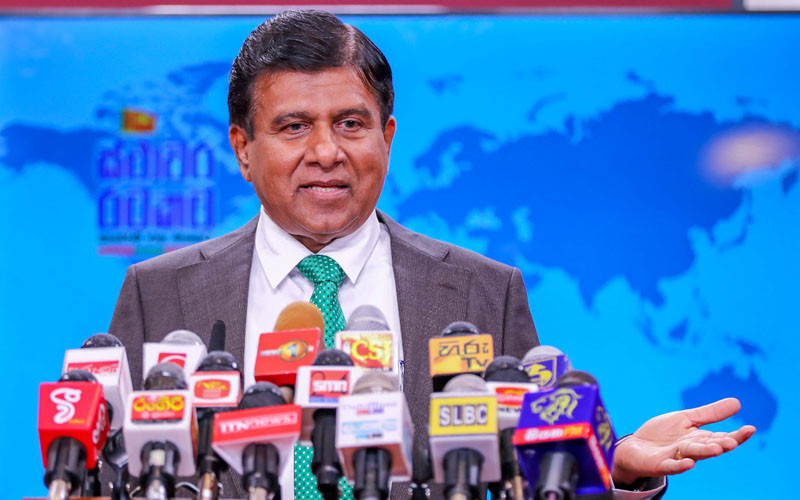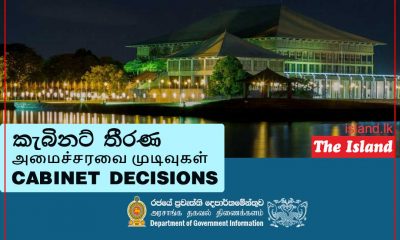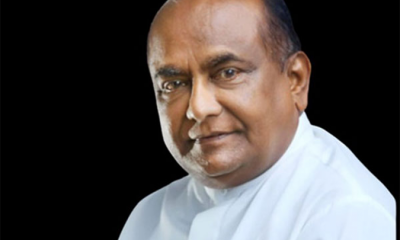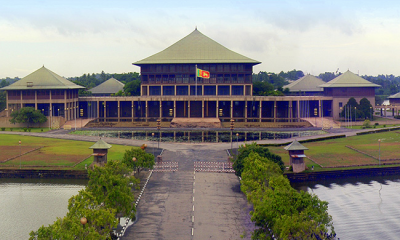News
New legislation for comprehensive regulation of microfinance institutions in Sri Lanka – Minister Wijayadasa Rajapakse

Minister of Justice, Prison Affairs and Constitutional Reform, Wijayadasa Rajapakse, unveiled plans to introduce a new legislative framework aimed at regulating microfinance institutions operating within the country.
Expressing deep concern regarding the unregulated status of certain microfinance entities, Minister Rajapakse emphasized the necessity for decisive measures. He underscored the intention to establish an independent regulatory institution, distinct from the Central Bank, dedicated to the oversight and effective regulation of microfinance entities.
Minister Rajapakse made these remarks on Monday (04) during a Press Briefing at the President’s Media Centre (PMC), under the under the theme ‘Collective path to a stable Country’.
The Minister further commented that the Ministry of Justice presently oversees the operation of 21 institutions, encompassing a diverse range of subjects, including law enforcement and law reform. With more than 1.1 million cases pending within the courts in the country, concerted efforts have been undertaken in recent times to mitigate delays in case adjudication. Substantial measures have been implemented to address the backlog and streamline the judicial process, with a particular focus on the establishment and operation of conciliation boards aimed at facilitating the expeditious resolution of select cases.
The Minister further stated that globally recognized expedited methods for resolving criminal cases stand in contrast to our nation’s outdate legal framework, resulting in prolonged durations for case resolutions. This delay in criminal proceedings represents a substantial issue, jeopardizing the administration of justice and leaving all parties involved without timely recourse.
To address this challenge, a draft law aimed at expediting the resolution of criminal cases is currently under development and is slated for submission to Parliament in January. In advanced jurisdictions, there is a paradigm shift towards non-custodial measures for individuals involved in minor offenses. Recognizing that incarceration, in many instances, is not the most suitable recourse, the new legal framework being proposed aims to explore alternatives. Notably, some individuals find themselves incarcerated due to societal oversights, and the proposed legislation acknowledges this by providing avenues for release on bail conditions. This approach aims to strike a balance between societal concerns and individual liberties, fostering a more nuanced and equitable criminal justice system.
The Office of Missing Persons currently manages a caseload of approximately 14,000 complaints. When assuming duties of this Ministry, only 62 complaints had been investigated. Presently, we have successfully concluded investigations for 4,795 complaints, reflecting a substantial improvement in case resolution. It is noteworthy that all outstanding complaints lodged with the Office of Missing Persons are slated for resolution by the coming year.
Furthermore, to fortify and enhance the efficiency of the judicial process, a comprehensive set of eight new bills is set to be submitted to Parliament.
Efforts are underway to establish a reconciliation society within each village, where government officials and politicians do not play a direct role. The activities of these societal initiatives, referred to as reconciliation societies, are guided by the preferences of elders and religious leaders within the respective villages. The responsibilities encompass the independent execution of tasks such as infrastructure development, including road construction and provision of electricity, rendering political involvement unnecessary.
The villagers take charge of organizing religious festivals, sports events and cultural celebrations, fostering a sense of community ownership and participation. The overarching vision is to seamlessly integrate each Grama Seva Division into a unified network, operating independently from external interference. The reconciliation society is entrusted with safeguarding the welfare and interests of the village, thereby ensuring the preservation and well-being of the community.
Presently, widespread discourse revolves around the state of the country’s economy, which has been adversely affected by various factors. The extensive toll on lives and property incurred during Prabhakaran’s war and the destructive actions of the JVP, including the burning of buses, transformers and over 25 courts, have significantly impacted the economic landscape. The repercussions of these incidents continue to reverberate, influencing the nation’s economic trajectory.
One pressing issue contributing to economic challenges is the unregulated proliferation of microfinance institutions, perceived as a substantial concern in the country. The absence of legal frameworks and regulatory oversight, coupled with the lack of registration with the Central Bank, has created an environment where individuals find it challenging to secure loans through conventional financial institutions due to their stringent rules. Consequently, many turn to microfinance institutions, exacerbating the existing economic predicament.
To address this concern, there is a pressing need to establish a dedicated regulatory body, separate from the Central Bank, to oversee and govern microfinance institutions. Efforts are underway to introduce comprehensive laws aimed at regulating these entities and mitigating the potential adverse effects they pose to the country’s economic stability. The goal is to instate a regulatory framework that ensures responsible and accountable practices within the microfinance sector, thereby contributing to the overall economic well-being of the nation.
(PMD)
News
US sports envoys to Lanka to champion youth development

The U.S. Embassy in Colombo welcomed the U.S. Sports Envoys to Sri Lanka, former National Basketball Association (NBA) and Women’s National Basketball Association (WNBA) players Stephen Howard and Astou Ndiaye, from June 8 through 14.
The Public Diplomacy section of the U.S. Embassy said that it would launch a weeklong basketball program intended to harness the unifying power of sports, made possible through collaboration with Foundation of Goodness and IImpact Hoop Lab.
While in Sri Lanka, Howard and Ndiaye, both retired professional basketball players, will conduct a weeklong program, Hoops for Hope: Bridging Borders through Basketball. The Sports Envoys will lead basketball clinics and exhibition matches and engage in leadership sessions in Colombo and Southern Province for youth aged 14-18 from Northern, Uva, Eastern and Western Provinces, offering skills and leadership training both on and off the court. The U.S. Envoys will also share their expertise with the Sri Lanka Basketball Federation, national coaches, and players, furthering the development of basketball in the country. Beyond the clinics, they will collaborate with Sri Lankan schoolchildren to take part in a community service project in the Colombo area.
“We are so proud to welcome Stephen and Astou as our Sports Envoys to Sri Lanka, to build on the strong people-to-people connections between the United States and Sri Lanka,” said U.S. Ambassador Julie Chung. “The lessons that will be shared by our Sports Envoys – communication, teamwork, resilience, inclusion, and conflict resolution – are essential for leadership development, community building, equality, and peace. The U.S. Sports Envoy program is a testament to our belief that sports can be a powerful tool in promoting peace and unity.”
News
Rahuman questions sudden cancellation of leave of CEB employees

SJB Colombo District MP Mujibur Rahuman in parliament demanded to know from the government the reasons for CEB suspending the leave of all its employees until further notice from Thursday.
MP Rahuman said that the CEB has got an acting General Manager anew and the latter yesterday morning issued a circular suspending leave of all CEB employees with immediate effect until further notice.
“We demand that Minister Kanchana Wijesekera should explain this to the House. This circular was issued while this debate on the new Electricity Amendment Bill was pending. There are many who oppose this Bill. The Minister must tell parliament the reason for the urge to cancel the leave of CEB employees,” the MP said.However, Speaker Mahinda Yapa Abeywardena prevented Minister Wijesekera responding to the query and said that the matter raised by MP Rahuman was not relevant.
News
CIPM successfully concludes 8th Annual Symposium

The Chartered Institute of Personnel Management (CIPM) successfully concluded the 8th Annual CIPM Symposium, which took place on 31st May 2024. Themed “Nurturing the Human Element—Redefining HRM in a Rapidly Changing World,” the symposium underscored the pivotal role of human resource management (HRM) in today’s dynamic global landscape. Since its inception in 1959, CIPM has been dedicated to advancing the HR profession through education, professional development, and advocacy, solidifying its position as Sri Lanka’s leading professional body for HRM.
Ken Vijayakumar, the President of the CIPM, graced the occasion as the chief guest. The symposium commenced with the welcome address by the Chairperson, Prof. Arosha Adikaram, followed by the Web Launch of the Symposium Proceedings and Abstract Book by the CIPM President. The event featured distinguished addresses, including a speech by Chief Guest Ken Vijayakumar, President of CIPM, and an address by Guest of Honor Shakthi Ranatunga, Chief Operating Officer of MAS Holdings Pvt. Ltd., Sri Lanka.
The symposium also featured an inspiring keynote address by Prof. Mario Fernando, Professor of Management and Director of the Centre for Cross Cultural Management (CCCM) at the University of Wollongong, Australia.
Vote of Thanks of the inauguration session was delivered by Dr. Dillanjani Weeratunga, Symposium Co-chair.
The symposium served as a comprehensive platform for researchers to present their findings across a wide range of critical topics in HRM. These included Cultural Diversity and Inclusion, Talent Development and Retention, Ethical Leadership and Corporate Social Responsibility, Adapting to Technological Advancements, Mental Health and Well-being at Work, Global Workforce Challenges, Employee Empowerment, and Reskilling and Upskilling.
The plenary session was led by Prof. Wasantha Rajapakse. Certificates were awarded to the best paper presenters during the valedictory session, followed by a vote of thanks delivered by Kamani Perera, Manager of Research and Development.
The annual symposium of CIPM was a truly inclusive event, attracting a diverse audience that spanned undergraduates, graduates, working professionals, research scholars and lecturers. This widespread interest highlights the symposium’s significance in the field of HRM, offering a unique opportunity for everyone to network and learn from scholarly brains.The CIPM International Research Symposium was sponsored by Hambantota International Port, Sri Lanka Institute of Information Technology (SLIIT), E B Creasy & Co. PLC, and Print Xcel Company.




















